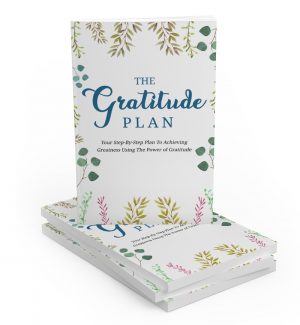 License Type: Master Resell Rights
License Type: Master Resell Rights  File Type: ZIP
File Type: ZIP
 SKU: 62218
SKU: 62218  Shipping: Online Download
Shipping: Online Download
Sample Content Preview
Introduction
Author, William Arthur Ward, once said, “Gratitude can transform common days into thanksgivings, turn routine jobs into joy, and change ordinary opportunities into blessings.” Gratitude is the unique quality of being entirely thankful for what you have, as well as always being ready to appreciate and help others. Gratitude is one of the primary keys to living a happy and prosperous life. For when you show gratitude for what you have, you are content with your life and positive about all that it has to offer.
If you feel a lack of gratitude in your life and are afraid that it may be creating a void, it is time for you to take action and learn how you can develop gratitude to live a happier life. If you are currently in a difficult situation in your life and think that it is impossible for you to be thankful, then it's time you learned how to cultivate gratitude and achieve greatness. With your determination and effort, you can quickly develop a sense of gratitude and become content with yourself and your life.
You can learn about what gratitude is and all the benefits it can bring you in your life. If you’re ready to improve your overall wellbeing and live a happier life, then you can learn to cultivate gratitude and achieve greatness. Gratitude, like any skill, can be learned and you can develop habits of gratitude. With practice, gratitude can become a choice. You can learn how to bring gratitude into your life and improve your relationships.
Chapter 1 – Defining Gratitude
Almost every day, we say thanks. We absentmindedly tell it to the grocery store checkout clerk and to the barista at our local coffee shop but are these sincere expressions of gratitude, or merely a response we've been conditioned to give?
What exactly is gratitude?
Is it something different than saying "thanks," or is the "thanks" a component of gratitude?
As you will discover as you read through this guide, a simple "thanks" can have a powerful impact on both the person communicating their appreciation and the person receiving that appreciation. This is especially true when the genuine emotion of gratitude backs the word. The question then becomes, what exactly is gratitude?
The Roman philosopher, Cicero, described gratitude as the greatest of virtues and the parent of all others. It is the key that opens all doors and is the quality that makes us and keeps us young. This statement, spoken more than two thousand years ago, is quite compelling. It speaks of gratitude as a virtue or quality of being. Gratitude is just this and so much more. Gratitude is also an emotion. It is something that we feel deep in our hearts. We can feel it toward others, when people are grateful to us, or when we see a person express gratitude toward another. As a sentiment or as an exchange between people, there is simplicity to being grateful. And yet, when trying to understand this simplicity, we can find a more complex meaning. Gratitude is an emotion, it is an experience, and it is a conscious choice for awareness. Connections in your relationships are both strengthened and fostered with gratitude.
At its core, gratitude holds an experience of universal belonging. We can experience a real sense of overall well-being when you practice the intentional cultivation of gratitude in our lives.
Gratitude as a State of Being
Take a moment and shut your eyes and try to recall a time when you felt appreciated. Remember this event as if it were happening at this very moment.
What words did you hear?
What did your body feel like at that moment?
What triggered the experience?
What were you thinking at the moment?
What did you enjoy most about being appreciated?
What about this particular moment brought you to remember it today?
Write down your answers to these questions in a notebook that you can refer back to later.
There isn’t a single definition of gratitude. Gratitude has been conceptualized and defined in the context of attitudes, emotions, morals, traits, habits, and even coping techniques. Gratitude is without a doubt, an incredibly complex and dynamic emotion. It is a skill that contributes to the satisfaction in relationships and human excellence.
Gratitude as an Emotion
In this context, we need to be sure to distinguish emotion from the mood. Emotion is about something or someone. It is about a personally significant circumstance or experience. A mood, on the other hand, is not connected to any object and is not dependent on any one thing. By exploring gratitude in this way, we can see that it occurs in response to an action within the framework of a relationship. Something has been given by someone and received by someone else. This exchange helps to foster the emotion of gratitude.
Gratitude is an empathic emotion, which means that in order to experience the emotion in exchange, the receiver needs to place himself in the position of the giver. A feeling of gratitude in response to the gift requires the recipient of the gift to sense the giver's positive intention. It is this recognition and empathic connection that provides the foundation for the emotional experience of gratitude in the interaction.
We can express gratitude for any number of reasons. We can be grateful for receiving personal benefits, such as advice from a mentor, or we can be grateful for material items, like a gift, our home, or a car. Gratitude can also be fostered through interpersonal fulfillment, such as getting a hug from a friend. Or, we can experience gratitude for a monetary gain, like getting a raise at work.








